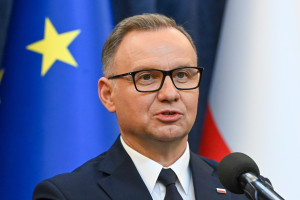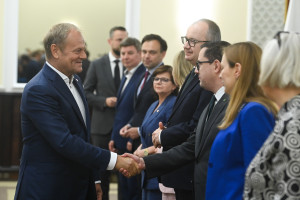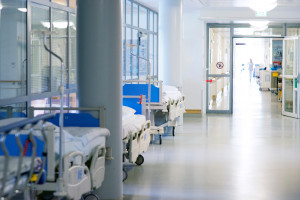National Security Council with Nawrocki's participation. Tusk: we will have to get used to each other

In Wednesday's meeting of the National Security Council, the subject of which was the security of the Polish energy system and the upcoming NATO summit in The Hague, at the invitation of the incumbent President Andrzej Duda - in addition to the "standard" composition - President-elect Karol Nawrocki participated.
At a briefing after the RBN meeting, Prime Minister Donald Tusk indicated that during the Council he had exchanged a "rather obvious remark" with Nawrocki that they both had to get used to each other .
- These are the rules of the game. We will cooperate in many areas, one way or another, if the whole election issue reaches a happy ending - said the head of government.
The Prime Minister also announced that at Wednesday's meeting of the National Security Council he "very clearly" raised the issue of the credibility of the presidential elections , pointing out that "it cannot be the case that anyone - because they have suspicions - considers these elections invalid or that they need to be repeated."
Citing media reports, he said that the number of election protests "has probably exceeded all of our imaginations."
- At the end of the day, we can expect about 30,000 protests that will reach the Supreme Court - he pointed out.
- It is not my task to decide which of these protests are justified and which are just signals without any confirmation. But it also strengthens my conviction - and I conveyed this to both presidents, the outgoing and the president-elect - that it is in the interest of the Polish state, in the interest of the future president, and also in the interest of the government, which will cooperate with the president, to dispel all doubts - said the prime minister.
In turn, Nawrocki, in his post on X, emphasized the energy security issue discussed at the Council. - Poland's energy security is a pillar of the sovereignty and stability of our economy. It is coal, nuclear power and common sense - not the Green Deal written in Brussels. Poland must be energy independent! - wrote Nawrocki.
After the meeting of the National Security Council, President Duda noted that it was "highly probable" that this would be the last Council he would convene; as he said, he had therefore invited President-elect Karol Nawrocki to help him get used to it and " so that he could already now build knowledge on those issues that are among the most important from the point of view of the security of the Republic of Poland ".
He also expressed hope that such action would become a tradition.
The President also stressed the importance of unity in security matters between individual authorities.
- This Council was, among other things, for the entire political scene to see this unity, evaluate it and express its opinion on it. I am glad that it took place - as always - in such a substantive formula, a good and objective discussion; the questions of the parliamentary side were answered - he said.
The president also appealed to the parliament to deal as soon as possible with his draft amendment to the Constitution, which envisages an obligation to spend 4% of Polish GDP on defense each year. He also referred to the priorities for the NATO summit, including increasing allied defense spending, emphasizing the cohesion of the Alliance and the importance of transatlantic relations, as well as expanding NATO infrastructure, including strategic pipelines, on the eastern flank.
The Speaker of the Sejm, Szymon Hołownia, said after the National Security Council meeting that there was an "intense political sparring" between some politicians during the session ; he also said that he had invited the future president to a meeting before he took office.
The leader of the Razem party, Adrian Zandberg, assessed that "the level of political conflict that we have in Poland is bad for large energy investments". He warned that if Poland does not accelerate its investments in nuclear energy, it is at risk of a "production gap".
The National Security Council is an advisory body to the president on matters of the country's internal and external security.
It consists of:
- Marshals of the Sejm and Senate,
- prime minister,
- heads of: MFA, MON and MSWiA,
- Minister Coordinator of Special Services,
- heads of groups with a parliamentary club, parliamentary group or parliamentary group (or chairmen of these clubs or groups),
- heads of the Chancellery of the President and the National Security Bureau.
The meetings of the Council are convened by the President, who also determines their topics.
Copyrighted material - reprint rules are specified in the regulations .
rynekzdrowia









